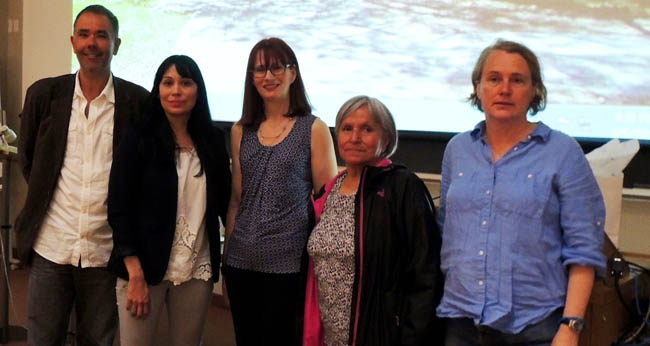Living languages discussed at TRY conference

By Christine Smith (McFarlane)
TORONTO – In a workshop entitled “The Living Languages of this Land: Collaborations in Indigenous Language Activism” at the TRY Conference that took place May 5, participants actively participated by speaking their languages. A second workshop saw librarians from three Universities discussed their roles within their library system.
The TRY Conference started in 2005. It is a conference for all staff who work in the libraries of the University of Toronto, Ryerson University and York University. The organizing committee is made up of staff representatives from all three library systems.
According to Maureen Morin, the co-chair of the TRY Conference Committee at the University of Toronto “Every year the conference has a new theme to help give focus to the presentations. This year’s theme “Access For All: Collaborative Solutions for Evolving Libraries,” which lent itself to discussion about access in its many forms and how we work with the many communities who rely on our services.”
Sara McDowell, a Reference Librarian in the University of Toronto Libraries, came to the committee to propose a sub theme about Indigenous librarianship,” says Morin. “She worked tirelessly to bring together the people who would deliver posters, presentations, panel discussions and a keynote address.”
Sara McDowell, a librarian who specializes in teaching people how to do library research and purchasing collections, says “since I am a librarian, I strive to find ways that I can support language revitalization in my work. I have been very fortunate to have the opportunity to learn from Elders, language teachers and activists to raise awareness in the library community, and supporting initiatives such as conferences and displays.”
“I am inspired by the work being done by Indigenous librarians in Canada and internationally, for example, the Indigenous Librarians Forum which will be held in Winnipeg this summer,” explains McDowell. “In library jargon access can mean equity and inclusion. The goal of the Indigenous theme in this context is to centre Indigenous knowledge and experience in librarianship. I am very grateful for the support provided by the conference organizers.”
The day concluded with an inspiring message from keynote speaker Susan Blight, a member of Couchiching First Nations, and the Aboriginal Student Life Coordinator at First Nations House.
“I’m going to talk to you about Indigenous languages and how libraries can really act as allies in the revitalization of our Indigenous languages,” says Blight. “All Indigenous languages in Canada are in danger of disappearing. At one point, Canada was home to more than 70 distinct Indigenous languages. At this point, there are just four that are considered ‘viable’ and expected to survive, and even for these the threat is real. Of Cree, Inuktitut, Dene, and Anishinaabemowin – the latter is the most vulnerable.”
Blight says that while the impending diminish of Indigenous languages is nearly universal, research indicates it is accelerated in urban areas. With the increase in movement of Indigenous people into urban areas, we see the decrease of Indigenous languages spoken daily in the home.
“The intersection of these two challenges: inter generational transmission of language and the decrease of Indigenous languages spoken in urban areas is something that I care deeply about and have looked at, thought about, and studied,” she says. “The challenge is how can we address these two challenges and resist alienation from the very thing that makes us who we are? First, we have to promote the beauty of the language, second, help non-Indigenous people to see the importance of the language, and third, find innovative ways to learn in places like the city. As Anishinaabe people, Anishinaabemowin is our inheritance. Our ancestors successfully resisted the Canadian state to keep our languages, along with our ceremonies and way of life, alive. What better way to honor our ancestors than to speak and preserve the language they gave to us? Brock Pitawanakwut writes that Anishinaabemowin, ‘exemplifies our adaptability and resilience as a people to recreate ourselves in new spaces while remaining rooted in Anishinaabe tradition and values’. I agree with this.”
Blight adds that the view the revitalization of Indigenous languages as a central part of the decolonization project and a central part of Indigenous resurgence.
“I believe that as Indigenous people, we will move forward with the teachings of our ancestors, carrying what we have learned from the now and the past, and remake our Indigenous nations, that includes revitalizing our languages and our knowledge systems.”

